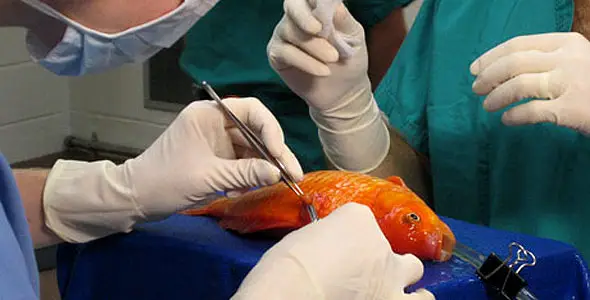Keeping fish often requires an investment. You must buy a tank and filters, decorations and plants, gravel and water heaters, and finally your fish. Depending on the type of tank you are setting up, the cost of purchasing these fish can stretch into the hundreds depending on species and sub-species. With so much money invested in the hobby, it is not all that surprising to find yourself looking for a veterinarian that treats fish when you find yourself faced with sick or dying fish.
Remember that most animals hide the signs of sickness or injury as a natural reflex. Showing weakness makes them more likely to be attacked and eaten by predators. If your fish is actually showing signs of distress or illness, they are in a very serious condition and should be taken to a professional as soon as possible. Keep in mind that fish, unlike some other animals, will continue to eat right up until death, so don’t mistake appetite as a sign that something serious isn’t wrong. It is unlikely that your veterinarian will be able to diagnose illness over the phone, so you may have to take your fish in. If you’re lucky, however, your vet may make house calls and will save you the trouble.
Transporting your fish to the vet doesn’t have to be a big hassle. Make sure that they are secured in a plastic bag with a large amount of air from which to receive oxygen. Make sure you bring them in tank water and then bring a second container of tank water. This way the staff can test the water and return the fish to familiar water after treatment. You will also want to bring any medications and supplements that you have used as well as a sample of food and feces, if you can find some. Avoid trying to treat your fish yourself. Most aquarists try two or three different treatments before seeking professional advice. This often does more harm than good, both for the sick fish and the other healthy fish alike.
You will also want to be sure that you know details of your tank. What other species do you have? What is the temperature of your water and how often do you clean? What are the brands and models of any air pumps and filters, heaters and lighting? Do you regularly check water quality? What are the numbers? How long has it been since you added new decorations? As with any doctor visit, the more information you can provide the better a picture your vet has to work with.
Keep in mind, veterinary science is not exact and exotic science even less so. While cats and dogs can let the doctor know when they are in pain, fish, birds, and reptiles often cannot. Have patience with your doctor and realize that sometimes, despite everyone’s best efforts, fish will die.




